Profit and prosper with the best of Kiplinger's advice on investing, taxes, retirement, personal finance and much more. Delivered daily. Enter your email in the box and click Sign Me Up.
You are now subscribed
Your newsletter sign-up was successful
Want to add more newsletters?

Delivered daily
Kiplinger Today
Profit and prosper with the best of Kiplinger's advice on investing, taxes, retirement, personal finance and much more delivered daily. Smart money moves start here.

Sent five days a week
Kiplinger A Step Ahead
Get practical help to make better financial decisions in your everyday life, from spending to savings on top deals.

Delivered daily
Kiplinger Closing Bell
Get today's biggest financial and investing headlines delivered to your inbox every day the U.S. stock market is open.

Sent twice a week
Kiplinger Adviser Intel
Financial pros across the country share best practices and fresh tactics to preserve and grow your wealth.

Delivered weekly
Kiplinger Tax Tips
Trim your federal and state tax bills with practical tax-planning and tax-cutting strategies.

Sent twice a week
Kiplinger Retirement Tips
Your twice-a-week guide to planning and enjoying a financially secure and richly rewarding retirement

Sent bimonthly.
Kiplinger Adviser Angle
Insights for advisers, wealth managers and other financial professionals.

Sent twice a week
Kiplinger Investing Weekly
Your twice-a-week roundup of promising stocks, funds, companies and industries you should consider, ones you should avoid, and why.

Sent weekly for six weeks
Kiplinger Invest for Retirement
Your step-by-step six-part series on how to invest for retirement, from devising a successful strategy to exactly which investments to choose.
So you want to learn more about personal finance but don't know where to begin? Finding information is not a problem. The amount of advice out there is overwhelming, especially when you're first starting out and aren't sure exactly what you're looking for -- or what you're doing. The trick is to find those gems of wisdom that'll teach you the basics of money management without leaving you feeling like you were hit by a bus.
Here are five great books that make finances simple. Whether you're looking for a basic guide to navigate your finances, a self-help book to start investing or a motivating tool to finally take your money habits seriously, there's something for every beginner here.
Each book is easy to understand -- no math major required -- and all come recommended not only from me but from several of my colleagues at Kiplinger's. I've included the list price for each book, but you can find them at drastic discounts on the Web. Either way, they're well worth the investment. (They also make great gifts, parents!)
From just $107.88 $24.99 for Kiplinger Personal Finance
Become a smarter, better informed investor. Subscribe from just $107.88 $24.99, plus get up to 4 Special Issues

Sign up for Kiplinger’s Free Newsletters
Profit and prosper with the best of expert advice on investing, taxes, retirement, personal finance and more - straight to your e-mail.
Profit and prosper with the best of expert advice - straight to your e-mail.
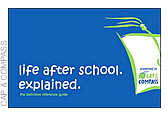
Life After School Explained
If you're clueless and overwhelmed by what lies in store after you untie yourself from Mom and Dad's purse strings, this is a good book to get your feet wet. It's short and humorous and doesn't weigh you down with a lot of confusing terminology.
I read it cover to cover in about two hours and actually understood what it said -- without my eyes glazing over once. It's sprinkled with witty anecdotes, pop culture references and comic strips to keep the mood light, even though it discusses such heavy-weight topics as choosing a health insurance plan, filling out tax forms and investing your money. It also covers lighter-yet-important subjects, such as how to avoid looking stupid at a business meal, what to wear on your first day of work and what to look for in a good apartment.
Life After School Explained is written by a team of young professionals who draw largely from their personal experiences in the real world. Its focus is for those who don't know anything about living on their own, which, whether we want to admit it or not, is probably most of us. It's basic, straight forward and a cinch to understand.
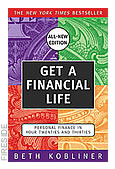
Get a Financial Life: Personal Finance in Your Twenties and Thirties
For a deeper understanding of financial principles to guide you through young adulthood, this is your bible. Here you'll find a collection of life's basic lessons on buying insurance, paying off debt, buying a home, saving money on taxes, managing your daily finances and investing for the long term.
But just because it's comprehensive doesn't mean it'll bog you down. Get a Financial Life is surprisingly readable, yet works well as a reference, too. Chapter one is a 12-page summary of the entire book - "a cheat-sheet for time-pressed readers," Kobliner calls it -- imparting quick financial wisdom on the book's entire range of topics. Then you can read the individual chapters for more information. Plus, the end of each chapter is capped off with a CliffsNotes-type summary to make sure you didn't lose anything in translation.
It's specifically written for the twenty- and thirty- something crowd, so you get tidbits of wisdom on topics and goals that you actually care about (for example, how to protect yourself when renting, how to pay off student loans and how to find the right mix for your investments when you're young). Get it. Read it. Reference it often.
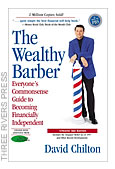
The Wealthy Barber
A big turn-off to reading a book about money is the snooze factor. Many are about as entertaining as a textbook. The Wealthy Barber, however, takes a novel approach to the self-help book -- it's written in a narrative.
It's the story of three young adults who realize that they don't know squat about how to create a long-term financial plan for their future. They turn to a parent for help who points them to an unlikely expert: The local barber, who managed to turn a low-wage job into a comfortable lifestyle with millions of dollars in the bank. The secrets imparted are simple and easy to follow, and it illustrates that you don't have to have a six-figure salary to live the good life.
"I have a very good friend who hands it out to almost anyone he knows and to kids when they graduate high school or college," says one of my colleagues at Kiplinger's. "It ain't hip or cool, but it's decidedly simple." Agreed. The Wealthy Barber certainly isn't a John Grisham novel, but at 211 pages it was readable and inspiring. I easily finished it in a weekend with plenty of time to re-evaluate my own long-term financial picture.
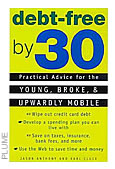
Debt-Free By 30
Most of the personal finance books for young adults are about how to get started on the right foot. Which is great, but what if you've already taken a misstep? This book is written by two self-described money misfits who spent their twenties piling up credit card and other debt, only to find their lives were being controlled by their poor money choices. "Death by plastic," Anthony and Cluck call it, and it wasn't pretty. Debt-Free by 30 is their first-hand tale of how they dug themselves out of the hole and got on the path to financial freedom. The job wasn't easy, as the authors are quick to point out, but it was worth it.
Don't let the word "debt" in the title stop you in your tracks. Anthony and Cluck know the topic is a weighty one, but they keep the mood light with jokes, financial IQ quizzes and humorous, blunt language that'll awaken your inner financial slacker to the error of its ways -- and motivate you to take action. (Hint: "Make your own damn frappuccino!")
Debt-Free By 30 covers the basics of prioritizing your debt, finding extra money to pay it down faster and handling situations in which you might be tempted to rack up more debt. Methodically paying off your credit cards may not sound sexy, but this book will make you a believer and give you the tools to pull it off.
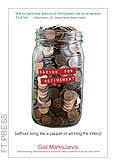
Saving for Retirement (Without Living Like a Pauper or Winning the Lottery)
What the heck is a stock or a mutual fund anyway, and why should I care? Pick up almost any book about investing, and you'll soon drown in a tsunami of terminology and complicated math to answer that question. But here is a book that actually manages to make sense of investing without confusing you along the way. MarksJarvis gives you a solid foundation of understanding of how investments work -- and how to make them work for you -- before diving in to the different kinds of investment products and accounts. What a crazy concept.
MarksJarvis doesn't try to impress you with her well of knowledge. Instead, she comes across as a patient and humble parent or teacher taking the time to make sure you know what you're doing. Saving for Retirement is a good size (228 pages) and the table of contents looks intimidating at first. But that's just because the book is broken down into small, easy-to-digest headings. That makes for quick referencing later.
Investing for the long-term should be a top goal for every young adult, and this book gives you the nitty gritty details you seek without sending your head into a spin. It's very thorough, yet simple to understand without making you feel like an idiot.
NEXT: Check out Kiplinger's selection of helpful personal-finance books
Profit and prosper with the best of Kiplinger's advice on investing, taxes, retirement, personal finance and much more. Delivered daily. Enter your email in the box and click Sign Me Up.

-
 Nasdaq Leads a Rocky Risk-On Rally: Stock Market Today
Nasdaq Leads a Rocky Risk-On Rally: Stock Market TodayAnother worrying bout of late-session weakness couldn't take down the main equity indexes on Wednesday.
-
 Quiz: Do You Know How to Avoid the "Medigap Trap?"
Quiz: Do You Know How to Avoid the "Medigap Trap?"Quiz Test your basic knowledge of the "Medigap Trap" in our quick quiz.
-
 5 Top Tax-Efficient Mutual Funds for Smarter Investing
5 Top Tax-Efficient Mutual Funds for Smarter InvestingMutual funds are many things, but "tax-friendly" usually isn't one of them. These are the exceptions.
-
 Four Smart Steps To Take Before Buying Your First Home
Four Smart Steps To Take Before Buying Your First Homehome Buying your first home can be daunting. Here are four things you need to do years before you start house-hunting to prepare financially for the biggest purchase of your life.
-
 How to Get Your First Credit Card
How to Get Your First Credit Cardcredit & debt Plus, how to use it wisely and earn the lowest interest rates.
-
 5 Smart Ways to Boost Profits at Your Lemonade Stand – or Any Small Business
5 Smart Ways to Boost Profits at Your Lemonade Stand – or Any Small Businessbusiness Make your lemonade stand stand out from the pack with these simple tips.
-
 How to Refinance Your Student Debt
How to Refinance Your Student Debtcredit & debt Consolidating student loans can reduce paperwork and lower your monthly bill.
-
 Should Young Adults Accept Financial Help From Their Parents?
Should Young Adults Accept Financial Help From Their Parents?savings Sometimes it makes financial sense to remain tethered to your parents, but work on a plan to start breaking the financial bond.
-
 Learning to Live With Debt
Learning to Live With DebtBudgeting Debt may be a part of your budget for decades to come. Establish a plan for managing it wisely.
-
 5 Hidden Costs That Surprise First-Time Home Buyers
5 Hidden Costs That Surprise First-Time Home Buyershome Make sure your budget is big enough to handle these unexpected expenses.
-
 6 Common Money Mistakes Newlyweds Need to Avoid
6 Common Money Mistakes Newlyweds Need to Avoidsavings Get your marriage off on the right financial foot by talking openly with your new spouse and avoiding these financial faux pas.
